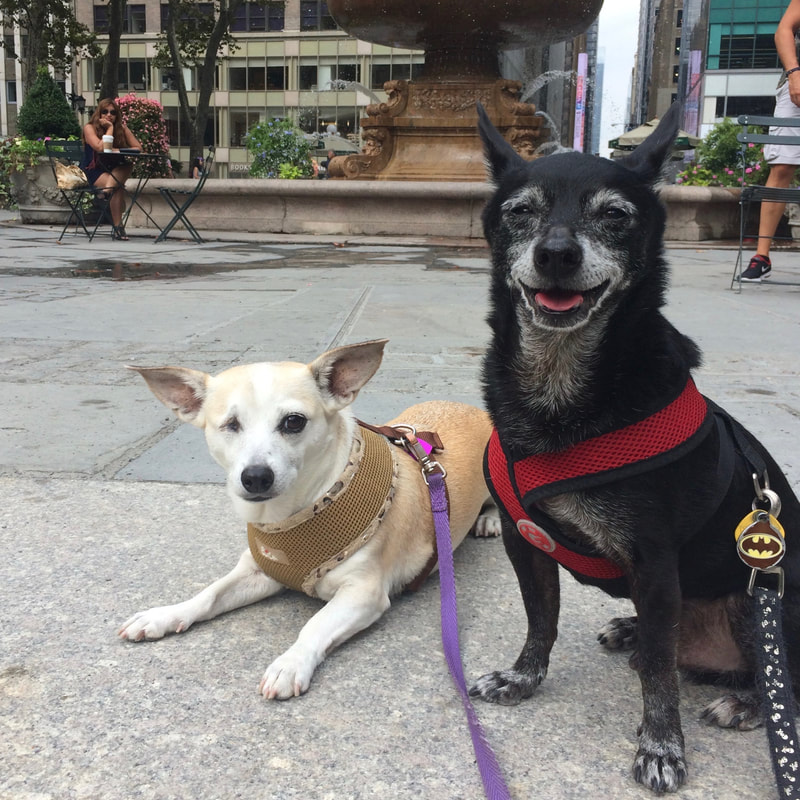|
Does your dog know how to sit, stay, and come in the house? What about in the park? If that second question makes you cringe, you’re not alone. A dog’s inability to respond to cues outdoors is a common problem, but there’s hope! Some patience and methodical training can help you teach your dog that “sit” means “sit,” no matter where you are. Read the full article here at petguide.com or click Read More if you don't see the text below. Why dogs don’t listen outside
You may have heard this before: dogs don’t generalize. But what does that mean? In short, if you only teach your dog to sit in your living room, he will think that the living room is one of the conditions needed to perform “sit.” It often takes basic-level, positive-reinforcement practice in several different locations before your dog realizes, “Oh, ‘sit’ means ‘sit’ no matter where I am.” This means you should do a few simple, fun training sessions in the park and on the sidewalk to show your dog what “sit” means in these contexts. Also consider the level of distraction when asking your dog to perform a behavior. The park is full of animals, bicycles, joggers, and more. Imagine how exciting that must be for your dog, and consequently, how much harder it is to focus on you and your cue to “sit.” The higher the distraction, the higher the challenge. Big request, big rewards Have you ever run a marathon? Would you ever want to? For some, running is in itself rewarding. For others, a marathon is too daunting on its own, but perhaps we could be persuaded. For instance, having a really sexy partner to train with you. Or a prize of a million dollars. Or the promise of a dream trip to Hawaii afterwards. The point is, we all work for rewards, but the type and amount of rewards will depend on the individual. Your dog is no different. Teaching him to sit in your living room is probably pretty easy; therefore, a low-level reward will suffice. Asking your dog to sit in the park as squirrels hop by? That’s asking a lot more, given the intense distractions, so the level of the reward should match the level of the request. In this case, a suitable reward for sitting might be a piece of cheese, getting his tennis ball thrown, or having permission to go off-leash. It all depends on what your dog values most. What grade is he in? Training for dogs, just like school for children, should follow grade levels. If the end goal is to get your dog to sit in a bustling park, consider that a “college level” sit. No one enters college without extensive prior schooling; first your dog has to complete elementary school, then middle school, and so on. Here are some examples of doggie grade levels for “sit”: Elementary school: sitting in your home with no distractions Middle school: sitting in your home when some calm guests are there; sitting outside when there are no distractions High school: sitting outside when there are distractions in the distance; sitting to be pet by a stranger on the street College: sitting inside when the doorbell rings; sitting outside when distractions are in the vicinity Plan for success To ensure you’re methodically increasing the difficulty of your dog’s training, write down your progress. Record the environment in which your dog performed the polite behavior (like “sit”), plus what kind of reward you used. If your dog is unsuccessful, you may have skipped a grade and asked your middle school pup to apply for college. Or, it could be due to a reward that doesn’t match the request. By writing it down, you’ll be able to address problems like this quickly. Since every dog is different, your progression will be unique, but by following these general guidelines you’re setting your dog up for success.
0 Comments
Your comment will be posted after it is approved.
Leave a Reply. |
Welcome!Kate is a certified dog behavior consultant, certified dog trainer, certified Fear Free professional, certified dog parkour instructor, and award-winning author. Categories
All
Archives
January 2024
The views expressed on this website belong to Kate Naito and may not reflect the views of the agencies with which she trains.
|




 RSS Feed
RSS Feed